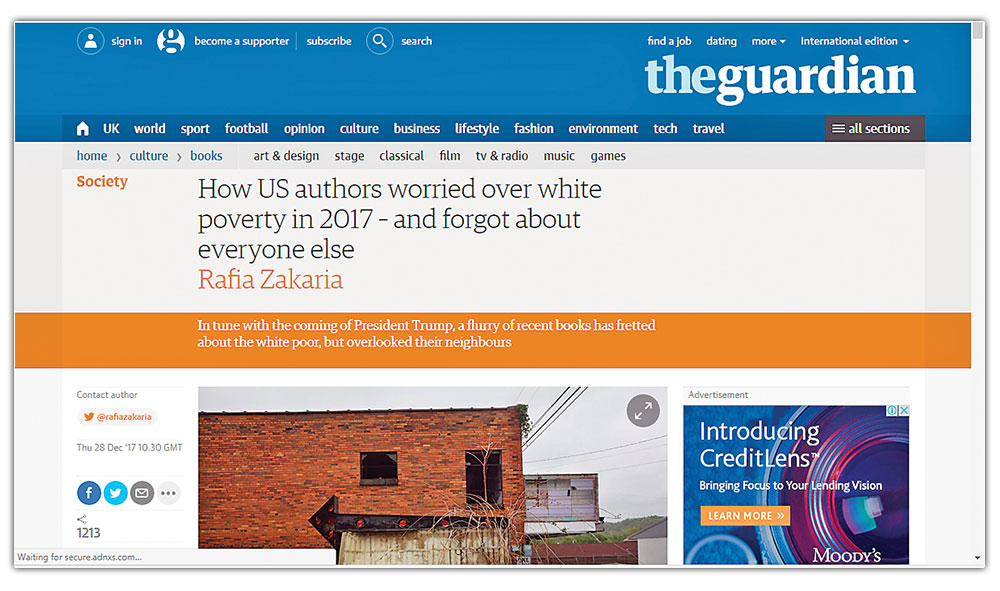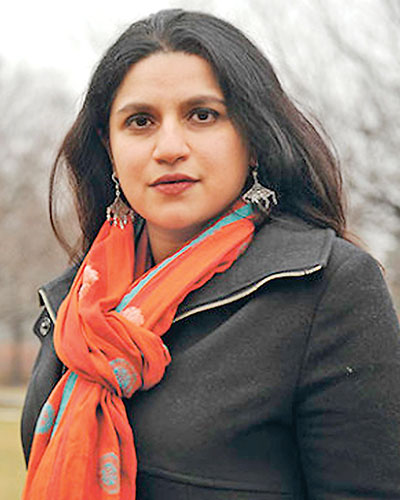MUSLIMS ENTER AMERICAN POLITICS
- 10 Nov - 16 Nov, 2018
Rafia Zakaria is one of the most incisive writers working today, someone both Pakistanis and Americans can be proud of for her humanity and forthrightness on behalf of vulnerable people. Most recently, on 28 December, The Guardian published a piece of hers headlined “How U.S. authors worried over white poverty in 2017 – and forgot about everyone else,” which I recommend highly.

She began by noting what she described as “a decent bit of outcry” against a tone-deaf recent New York Times article that, as she described it, “presented a neo-Nazi as just another member of America’s beleaguered and victimised white working class.” Citing the Times’s “coy treatment” of the white-supremacist Traditionalist Workers Party, she devotes much of her article to reviewing a “little genre boom” in sympathetic books about the American white working class – including bestsellers like Hillbilly Elegy by J.D. Vance and Strangers in their Own Land by Arlie Hochschild – calling them “rife with glib omissions, tossing up words like ‘community’ and ‘little guy’ while only meaning certain communities, certain little guys.”

She also discusses The Once and Future Liberal, a tiresome-sounding polemical book by white liberal academic Mark Lilla that got rather a lot of attention in 2017. Lilla objects to “identity politics” and asserts that (in Rafia’s paraphrase) “the Democratic party would not win votes in the south and midwest if they kept telling white people that they were privileged, racist or homophobic (regardless of whether they actually were).”
“Regardless of whether Lilla’s solution would actually see off Trump and bring a victory for Democrats,” asserts Rafia Zakaria, “white poverty is not deserving of special sympathy, only the same sympathy that all of America’s poor deserve.” Hear, hear. She goes on: “This is what Ta-Nehisi Coates zeroes in on when he notes: ‘The expectations are built upon being white… You want to talk about unmet expectations, black folks have been dealing with that since we got here.”
I heartily endorse Rafia’s article in full. (The headline given to it by The Guardian’s editors is rather less subtle than the article itself. That’s the way headlines often are, which only underscores the importance of writing and reading actual articles and essays, rather than only headlines and tweets.) I have no bone to pick either with her or with Coates, the recently and deservedly prominent African American essayist. Both are essential writers we all should be reading and heeding. I want only, in this modest weekly space I’m granted, to add a few thoughts of my own that have been very much on my mind for several years now.
Those thoughts are prompted by my own identity as a writer who has worked hard to be cosmopolitan but who is also, unavoidably, a white male American. On the personal level – and like millions of others, including most of my left-leaning friends – I have white, middle- or working-class relatives who voted for Trump. Some of them – mercifully for me, all on my in-laws’ side of the family – remain unapologetic about it.
Seismic political events – like, say, the 1947 partition or the 1977 coup in Pakistan – have a way of forcing individuals to make momentous, life-changing choices, and of causing or exposing often irreparable rifts within families. The 2016 American presidential election was such an event. I daresay tens of millions of us around white America are struggling with its import, not only on the public level but with painful intimacy among our own loved ones.
I find myself also struggling on another level, as a writer. What do I have to say? What should I say? On many occasions over the past year, I’ve concluded that the best thing I can contribute as a writer is nothing. My voice often is not needed. Sometimes that’s because many others are saying what I would say, and sometimes it’s because the “I” of my writing is unavoidably white and male. So be it. I’m happy to remain silent when that’s what’s needed from me.
What I can’t afford to be, though, is merely apologetic for being who I am, demographically. I can’t change that – and, by the same token, I appreciate it when people from backgrounds different from mine are kind and thoughtful enough to refrain from attacking me for it. Yes, I am white and male, but I am also a particular individual who has worked hard to supplement and correct my background with a hard-earned wealth of mind-broadening reading and international travel, throughout three decades of adult life. I’m doing all I can to make the most of the opportunity I have to become properly educated, over the course of the one lifetime available to me. That effort has included visiting Pakistan many times, living there for a period in 2003-04, and writing the book Alive and Well in Pakistan.
I want to return to the words of Ta-Nehisi Coates: “The expectations are built upon being white… You want to talk about unmet expectations, black folks have been dealing with that since we got here.” He’s right. And yet J.D. Vance is also right, when he draws a distinction between “Wasps of the Northeast” and provincial whites like his own family, for whom “poverty is a family tradition.” My politics are not Vance’s politics, and my background is more privileged than his. But, like him, I am a provincial as well as an ethnic mongrel, and I emphatically share his resentment of elite whites from the Northeast of the U.S. So where does that leave me? Well, I’m still white. But I don’t enjoy the same privileges or protections as Northeastern Wasps.
Just as “the Muslim world” is not monolithic, neither is white America. Its longstanding political hegemony and broad middle-class popular culture can make it look monolithic, but it’s not. The bottom line is that all societies are pluralistic. And that’s not a political position; it’s just a fact.”
COMMENTS